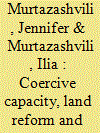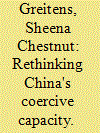| Srl | Item |
| 1 |
ID:
152308


|
|
|
|
|
| Summary/Abstract |
This article compares four historical periods in Afghanistan to better understand whether land reform in the post-2001 context will improve prospects for political order. Its central finding is that political order can be established without land reform provided that the state is able to establish and maintain coercive capacity. However, the cost of establishing political order mainly through coercion is very low levels of economic development. We also find that when land reform was implemented in periods of weak or declining coercive capacity, political disorder resulted from grievances unrelated to land issues. In addition, land reforms implemented in the context of highly centralized political institutions increased property insecurity. This suggests the importance of investing in coercive capacity alongside land reform in the current context but also that establishing inclusive political institutions prior to land reform will increase its chances of success.
|
|
|
|
|
|
|
|
|
|
|
|
|
|
|
|
| 2 |
ID:
156607


|
|
|
|
|
| Summary/Abstract |
Discussions of China's rising domestic security expenditure often present this spending as evidence of the Chinese Communist Party's strong coercive capacity. This article argues that a lack of theoretical clarity about domestic security has resulted in flawed conclusions about these expenditures and their implications for China's coercive capacity. Challenging the conventional wisdom, the article analyses China's domestic security spending from 1992 through 2012 and argues that it is important to consider not only the total amount that China spends but also how it spends these resources and the magnitude of the threats that this expenditure must address. It finds that China's domestic security spending is not historically unprecedented, is not expanding as a proportion of national expenditure, and is not necessarily high (or producing high coercive capacity) when compared to other countries. The article also shows that certain locations struggle more to fund their coercive capacity than others, and that these locations overlap with areas where internal security threats may be particularly acute. The challenges that the coercive apparatus must address have also grown over the same period during which domestic security spending has risen. Finally, attempts to improve the political position of China's coercive agents cannot be equated with improvements in their capacity to manage Chinese society. Cumulatively, this reassessment provides more evidence of the limitations on China's coercive capacity than of its strength.
|
|
|
|
|
|
|
|
|
|
|
|
|
|
|
|
| 3 |
ID:
121254


|
|
|
|
|
| Publication |
2013.
|
| Summary/Abstract |
In response to worsening social instability in China, among
grassroots communities in the poorer central and western provinces in
particular, the Chinese central government has made budgetary arrangements, since 2003, to increase investment at the grassroots level to improve the capacity of local governments to maintain social order. However, this action by central government has created a dilemma for local
cadres: how to perform their duty to maintain social stability while also
balancing a heavy fiscal burden caused in part by the receipt of insufficient additional budgetary subsidies from higher government. This paper
is an account of and an analysis of how local cadres in China perform
their official duties when faced with this dilemma.
|
|
|
|
|
|
|
|
|
|
|
|
|
|
|
|